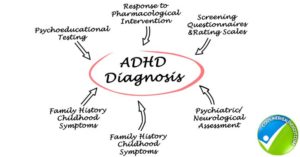People with ADHD may have trouble paying attention, controlling impulsive behaviors (may act without thinking about what the result will be), or be overly active. Although ADHD can’t be cured, it can be successfully managed and some symptoms may improve as the child ages.
The symptoms the child may show that could indicate ADHD if this has been the last 6 months or more: The CDC presents that 6 of these symptoms or more of inattention for a child at 16 years old or less or at 17 years old to adult 5 or more signs and symptoms present. This would be the following s/s for inattention:
- Often fails to give close attention to details or makes careless mistakes in schoolwork, at work, or with other activities.
- Often has trouble holding attention on tasks or play activities.
- Often does not seem to listen when spoken to directly.
- Often does not follow through on instructions and fails to finish schoolwork, chores, or duties in the workplace (e.g., loses focus, side-tracked).
- Often has trouble organizing tasks and activities.
- Often avoids, dislikes, or is reluctant to do tasks that require mental effort over a long period of time (such as schoolwork or homework).
- Often loses things necessary for tasks and activities (e.g. school materials, pencils, books, tools, wallets, keys, paperwork, eyeglasses, mobile telephones).
- Is often easily distracted
- Is often forgetful in daily activities.
For hyperactive or impulsive behavior same concept with the amount of s/s at the same age groups with inattention, which could be:
- Often fidgets with or taps hands or feet, or squirms in seat.
- Often leaves seat in situations when remaining seated is expected.
- Often runs about or climbs in situations where it is not appropriate (adolescents or adults may be limited to feeling restless).
- Often unable to play or take part in leisure activities quietly.
- Is often “on the go” acting as if “driven by a motor”.
- Often talks excessively.
- Often blurts out an answer before a question has been completed.
- Often has trouble waiting his/her turn.
- Often interrupts or intrudes on others (e.g., butts into conversations or games)
Myths and Facts about ADD / ADHD in Adults
MYTH: ADD/ADHD is just a lack of willpower. Persons with ADD/ADHD focus well on things that interest them; they could focus on any other tasks if they really wanted to.
FACT: ADD/ADHD looks very much like a willpower problem, but it isn’t. It’s essentially a chemical problem in the management systems of the brain.
MYTH: Everybody has the symptoms of ADD/ADHD, and anyone with adequate intelligence can overcome these difficulties.
FACT: ADD/ADHD affects persons of all levels of intelligence. And although everyone sometimes has symptoms of ADD/ADHD, only those with chronic impairments from these symptoms warrant an ADD/ADHD diagnosis.
MYTH: Someone can’t have ADD/ADHD and also have depression, anxiety, or other psychiatric problems.
FACT: A person with ADD/ADHD is six times more likely to have another psychiatric or learning disorder than most other people. ADD/ADHD usually overlaps with other disorders.
MYTH: Unless you have been diagnosed with ADD/ADHD as a child, you can’t have it as an adult.
FACT: Many adults struggle all their lives with unrecognized ADD/ADHD impairments. They haven’t received help because they assumed that their chronic difficulties, like depression or anxiety, were caused by other impairments that did not respond to usual treatment.
Source: Dr. Thomas E. Brown, Attention Deficit Disorder: The Unfocused Mind in Children and Adults
It is understandable for parents to have concerns when their child is diagnosed with ADHD, especially about treatments. It is important for parents to remember that while ADHD can’t be cured, it can be successfully managed. There are many treatment options, so parents and doctors should work closely with everyone involved in the child’s treatment — teachers, coaches, therapists, and other family members. Taking advantage of all the resources available will help you guide your child towards success. Remember, you are your child’s strongest advocate!
In most cases, ADHD is best treated with a combination of medication and behavior therapy. Good treatment plans will include close monitoring, follow-ups and any changes needed along the way.
Following are treatment options for ADHD:
- Medications
- Behavioral intervention strategies
- Parent training
- ADHD and school
Part 2 Tomorrow on Adult ADHD.

